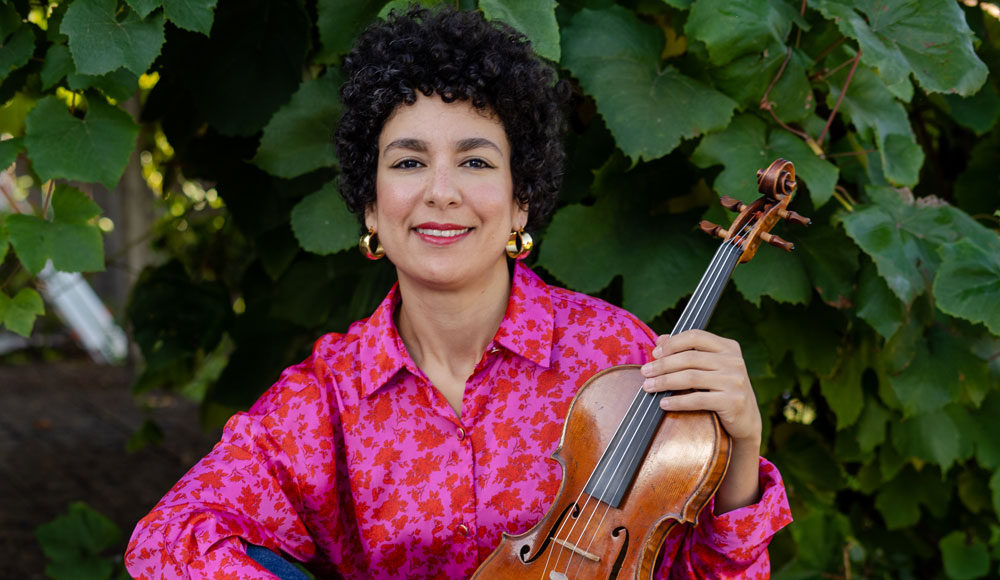Basma Edrees had to leave her native land to learn its music.
“Surprisingly, it’s when you go away from home that you begin to realize, ‘I need to be more connected to my roots, to my culture,’” the Egyptian-born musician says.
After spending years studying western classical music in Cairo, the violinist and educator began to immerse herself in Arabic music once she moved to the United States with her family in 2006. The exploration led her to found the instrumental ensemble Music in-Takht in 2022. With the mission of sharing and preserving Egyptian musical heritage in the Bay Area, the group has crafted a new program called “From Farouk to Fusion.”
“The performance will take you on a journey of the evolution of Egyptian instrumental music,” Edrees says, “starting from the era of King Farouk, who was the last king of Egypt.”
Traditional pieces from the early 20th century slowly shift to more modern sounds, with piano, flute and saxophone incorporated. “The vibrant landscape of contemporary Egyptian instrumental music includes a lot of fusion with jazz,” Edrees says.
In addition to the violinist, oudist Moe Elshazly, percussionist Mohamed Abdelradi and bassist Amr Toppozada make up the ensemble. Guest artists Jon Dryden, Ray Furuta and Carl Schultz also join in to bring the jazz.
One could trace Music in-Takht’s origin point to the moment Edrees first picked up a violin at age four. “I was singing before I was talking,” she says. Though there were no other musicians in her family, her parents nurtured her talent, enrolling her in a group violin class at the Cairo Opera House after seeing an ad in the local paper.
From there Edrees thrived, eventually moving to New York City to study at Juilliard, among other institutions. Work with the Oakland Symphony, the San Francisco Ballet, the San Jose Chamber Orchestra and other organizations cultivated her present commitment to the Bay. She is currently on the violin faculty of the Department of Music at Santa Clara University.
Through the decades, Edrees has been able to experience diverse scenes and reflect on her identity as an Arab musician within the broader world of instrumental music.
The pathways for a career in western classical music were clear and well entrenched as she entered the profession. “It just didn’t feel good that I didn’t know my own musical tradition,” she says. “When I decided to embark on this journey on my own, I discovered Arabic music sits on the same echelon of beauty and complexity as western classical music. You know, the maqam system—the system of modes that this music is based on—requires a lot of immersion, a lot of work.”
Ultimately, Edrees is not interested in pitting western music against Arabic music or choosing one style over the other. “They are two different languages,” she says. “They have very different tools of expression to offer.” Where the former fills rooms with intricate counterpoint and beautiful harmony, the latter offers more notes—there are half-flats in the Arabic scale, for example—expanded melodic possibilities, colorful intonation and, of course, different instrumentation.
Out of this spirit of openness, Music in-Takht was born. The ensemble’s name itself has a dual meaning that embodies Edrees’ approach. Pronounced like the English word intact, the group promises coherence and high standards. At the same time, the word takht in Arabic refers to a classical music ensemble and calls to mind the period in the first half of the 20th century when instrumental music flourished in Egypt.
While the ensemble’s latest program spans genres—reviving old gems and even including some samba, another one of Edrees’ passions—the Arabic elements are closest to her heart. “I felt like it was important to do this for my community and for my daughter, who will grow up in this country,” she says. “I want her to have a connection with home. The way I can do that is with music.”
Especially as narratives that emphasize violence continue to dominate and oversimplify mainstream understandings of the Middle East, Edrees is aware of the cultural activism woven into her work. For example, “From Farouk to Fusion” shines a light on the suffering in Gaza with the inclusion of two pieces by contemporary Palestinian composers. This is part of Music in-Takht’s broader mission to insist upon the humanity of Arab people.
“There must be some representation of who we are, just the way we are,” Edrees says. “The problem is always that people don’t know us. They are being told who we are by people who are not us. The stereotypes and the image being portrayed of us is one that I personally don’t recognize.”
“This music has a way of fighting prejudice. People come out feeling like, Wow, I didn’t know this.”
Music in-Takht performs May 24 at 8pm at the Mountain View Center for Performing Arts’ SecondStage. Tickets are $43. tickets.mvcpa.com



